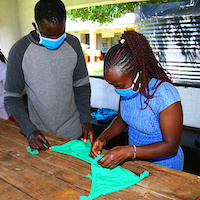Our work for women
In our last blog we discussed UNiTE (the UN Secretary-General’s UNiTE to End Violence against Women campaign) and the 16-day campaign calling for a world free from violence against women and girls. Don’t forget it’s still in progress!
We also promised to tell you more about the work Friends of Londiani does in many different programmes, work that contributes, directly or indirectly, towards the elimination of violence against women.
The most obvious example is the Alternative Rite of Passage. Friends of Londiani works in an area where female genital mutilation (FGM) is still widely practised. This is not just unnecessary and gruesome and a threat to health. It has longer-term implications. A girl who is circumcised is more likely to leave school early, marry early, have no paid income, have her first child early and give birth at home. Both mother and child are at a higher risk of dying through childbirth if the mother has been circumcised.
However, while the negative implications of this practice are becoming more widely understood and accepted, certain less harmful cultural concepts to do with growing to womanhood are also involved. Therefore an Alternative Rite of Passage (ARP) has been developed in partnership with the local communities. This rite of passage is an important cultural celebration that marks a girl’s ‘coming of age’. It retains the rich heritage of tribal practices and prepares a girl with knowledge and information about becoming a woman, but keeps her safe from the harmful practice of circumcision.
Sometimes it isn’t about actual violence but less obviously hurtful injustices like restricting access to jobs, education and economic empowerment. Do these matter as much? Perhaps. For example, if a girl can stay in education for longer, she stays healthy and HIV negative, she marries when she chooses and she raises a healthy family. She therefore has the opportunity to raise the standard of living for her and her family in the long term.
That's part of the inspiration for Friends of Londiani’s work on the Girls for Girls programme, which aims to ensure that no girl will miss a day of school because of lack of access to affordable, hygienic sanitary products. Working through schools and costing €50 per child, the programme includes infrastructure costs for school latrines and washrooms, a health education programme, re-usable sanitary towel kits and an income-generating component.
How does this help women? By giving them more control over their lives. Girls for Girls is proving hugely successful in lowering rates of absenteeism among girls at school, boosting their confidence and morale and empowering them through knowledge and understanding to be more in control of their bodies. In the long term this knowledge becomes the power to make decisions about their own health care throughout their lives.
We’ll tell you a bit more about our work for women in our next blog. But in the meantime, do have a look around www.unwomen.org and, of course, this site, and see what others are doing to make women’s lives better. And if you feel you have a skill or a talent to offer that could help — please do!

